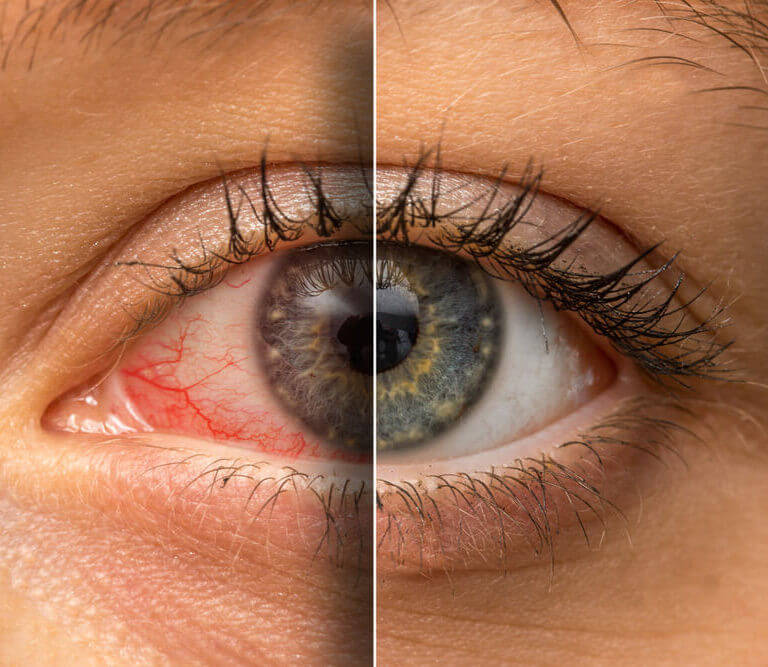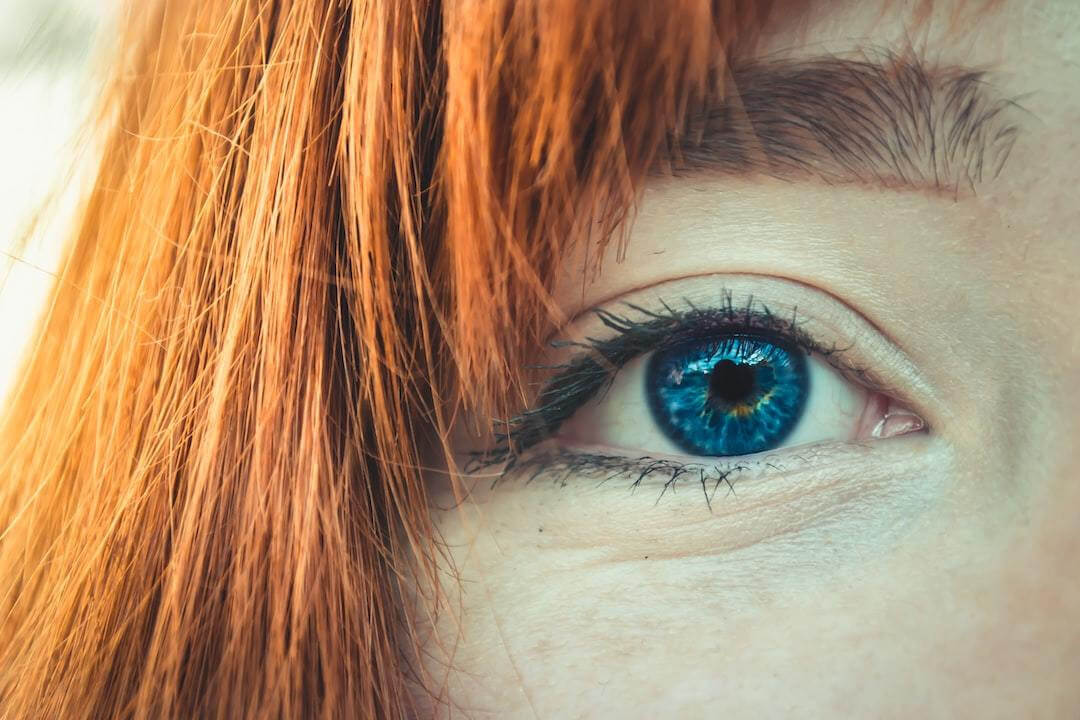Can you sunburn your eyes? This question may seem unusual, but the answer is yes. Our eyes can suffer the same harm from UV light that our skin does, a condition known as photokeratitis and it's a serious concern that warrants attention.
In this blog post, we will delve into what causes sunburned eyes and explore common symptoms to watch out for. We'll also discuss how long photokeratitis typically lasts and provide insights on prevention strategies to protect your vision from harmful UV ray exposure.
We'll look at various treatment options available for those who experience eye sunburn. Finally, we'll touch upon potential eye conditions and complications of untreated or recurrent cases of photokeratitis and how to prevent sunburned eyes. So if you've ever wondered "can you sunburn your eyes?", keep reading to learn more about this important eye health topic.
Table of Contents:
- Causes of Sunburned Eyes
- Symptoms of Sunburned Eyes
- How Long Does Photokeratitis Last?
- Preventing Sunburned Eyes
- Treating Sunburned Eyes
- Complications of Sunburned Eyes
- Conclusion
How Can You Sunburn Your Eyes
The sun's rays can also be harmful if you don't use the proper protection - even for your eyes. Too much sun exposure and UV rays from the sun can burn your eyes, causing Photokeratitis, a sunburn on the cornea and conjunctiva of your eye. UV radiation can come directly from sunlight or reflected off surfaces like water or snow.
Risk Factors
- Snow: Reflects up to 80% of UV radiation, increasing risk in snowy conditions.
- Water: Reflects about 10% of UV rays, but combined with direct exposure from above can still lead to Photokeratitis.
- Elevation: The higher you go, the stronger the UV radiation because there's less atmosphere to absorb these harmful rays.
- Meds & Cosmetics: Certain medications and cosmetics make your skin more sensitive to light, increasing susceptibility for Photokeratitis.
Besides natural sources, you can get photokeratitis from UV light sources other than the sun, including:
- Tanning beds or booths with artificial UV lights
- Certain welding equipment
- Floodlights used in photography
- Laser lights
- Halogen lamps or other very bright lights like highway lights
- Electric sparks
- Lightning
Your Eye's Natural Protection Isn't Enough
Your pupils constrict under bright light, reducing the amount entering them, while eyelids act like visors shielding some incoming light. However, this natural protection isn't enough, especially during peak hours when sunlight is strongest between 10 AM - 4 PM local time. Clouds only block about one-tenth of solar radiation, according to Mayo Clinic studies.
Watch out for the risks associated with too much exposure and take necessary precautions to protect yourself whenever you're out enjoying the sunshine.
Symptoms of Sunburned Eyes and too much Sun Exposure
It's not just your skin that can get sunburned; eyes can too. It's true. Here are some signs to look out for:
Redness
If your eyes look like they've been partying all night, they might be sunburned. Too much UV exposure can turn the whites of your eyes pink or red.
Pain and Discomfort
Feeling like you have sand in your eyes? Ouch. That could be a sign of sun damage. Blinking excessively or not being able to open your eyes fully are also common symptoms.
Swelling
Did your eyelids puff up like a blowfish? That's not a good sign. Swelling can occur if your eyes have been exposed to UV rays for too long without protection.
Tearing Up And Sensitivity To Light
Are you crying for no reason? Your body might be trying to protect your eyes from further harm. Increased sensitivity to light is also common.
Vision Changes
Seeing halos around lights or experiencing blurry vision? These symptoms could indicate severe cases of sunburned eyes and require immediate medical attention. Don't wait until it's too late.
Remember, prevention is key. Wear sunglasses and a hat to protect your eyes from harmful UV rays which can help prevent photokeratitis. Seek help promptly if your eyes feel any of these signs or speak to your eye doctor.
How Long Does Photokeratitis Last?
Yes, you can sunburn your eyes. It's called photokeratitis and it hurts like a sunuvabiscuit. But how long does it last? Let's find out.
Photokeratitis, aka 'snow blindness', can last from 6 to 48 hours after exposure to intense UV radiation. The duration of symptoms depends on the extent of exposure and individual sensitivity. Some people recover quickly, while others suffer for days.
Symptoms and Eye Conditions of Photokeratitis
Redness, tearing, blurred vision, and temporary loss of vision can appear several hours after excessive UV exposure. It feels like having sand in your eyes - not fun.
Recovery Time
Recovery is typically complete within 24-72 hours when proper care and treatment are received, with no lasting harm. But repeated instances of photokeratitis could lead to permanent eye damage like cataracts or macular degeneration.
A Note on Severity
Severe cases involving prolonged direct gaze at the sun, like during a solar eclipse, can cause solar retinopathy and longer-lasting visual impairment. The American Academy of Ophthalmology strongly advises against gazing directly at the sun without proper eye protection.
If you suspect you have photokeratitis, seek medical attention promptly. Early detection means early treatment and quicker recovery times. Don't mess with your eyes, folks.
Preventing Sunburned Eyes
Don't let the sun take advantage of your eyes; use sunglasses to protect them. Follow these tips to protect your peepers:
Shade Your Eyes by wearing Sunglasses
Make sure your sunglasses block 100% of UVA and UVB rays. Check out Just Human, our sunglasses come with sport performance mineral glass lenses with a dual sided 100% UVA/UVB protection coating, along with a glare coating for maximum protection against the sun's harsh light.
Cap It Off with a Hat
Wear a hat with at least a three-inch brim to protect your eyes from the sun's glare during peak hours. This is especially important during peak sun hours (10 AM - 4 PM).
Don't Be Snow Blind
When hitting the slopes, protect your eyes from the glare of the snow with goggles or glasses designed for snow sports. Look for options that offer complete UV protection.
Spread the Word
Help others protect their eyes by promoting eye health awareness. May is Healthy Vision Month, so it's the perfect time to remind everyone to prioritize their vision health.
Don't Let the Sun Get the Best of Your Eyes
Remember, your eyes are precious. Take care of them by following these simple tips and avoiding prolonged exposure to sunlight without proper eye protection.
Treating Sunburned Eyes
Got sunburned eyes? Ouch. Here are some ways to ease the pain and promote healing:
Cool Compresses
Chill out with a cool compress. Soak a cloth in cold water, wring it out, and apply to your eyes for 10-15 minutes intervals until you feel better. Repeat every few hours until you feel better.
Artificial Tears
Moisturize your dry, irritated eyes with over-the-counter artificial tears or eye drops. These eye drops mimic natural tears and can help flush out irritants while providing soothing relief.
Avoid Eye Strain
Give your eyes a break and avoid activities that could strain them further, like reading or using electronic devices without proper protective eyewear.
Pain Relievers
If the pain is mild to moderate, non-prescription pain relievers like ibuprofen or acetaminophen may help reduce inflammation and ease discomfort. But always check with an ophthalmologist before starting any new medication regimen.
Note:
- If home remedies don't work within 48 hours,
- If your symptoms get worse,
- If you have vision changes like blurred vision or sensitivity to light,
Seek medical attention right away and speak to your eye doctor.
Remember: prevention is key. Guard your peepers from the sun's hazardous radiation by wearing shades and a lid when you're outside.
Complications of Sunburned Eyes
Did you know that your eyes can get sunburned? It's called photokeratitis, and it can lead to serious long-term vision problems like cataracts and macular degeneration.
Cataracts and Macular Degeneration: The Long-Term Risks
Cataracts: The lens becomes cloudy, leading to blurred vision. Prolonged UV light exposure may eventually lead to the development of cataracts, necessitating surgical intervention if left unchecked. If left untreated, surgery may be required.
Macular Degeneration: Damage to the retina results in loss of central vision. Extreme sunlight exposure without proper protection can cause this disease.
The Importance of Early Treatment
Treating sunburned eyes promptly not only alleviates immediate symptoms but also reduces risks associated with severe complications later on in life. Seek medical attention immediately if you suspect your eyes have been sunburnt.
Avoiding Repeated Exposure
Wear appropriate eyewear and limit time spent under direct sunlight during peak hours to prevent future incidents.
Protect your eyes from harmful rays emitted by the sun. By taking preventative measures against UV radiation and treating any instances of eye-sunburns swiftly and effectively, we're doing ourselves a favor both now and down the line.
Conclusion
Can you get a sunburn on your eyeballs? Yes, you can! Prolonged exposure to UV rays can cause photokeratitis, which is like a sunburn on your eyes.
To avoid this painful experience, make sure to wear sunglasses with proper UV protection and a wide-brimmed hat when you're outside.
If you do end up with photokeratitis, don't rub your eyes and call your eye doctor to seek medical treatment right away.



.jpg)
.jpg)


